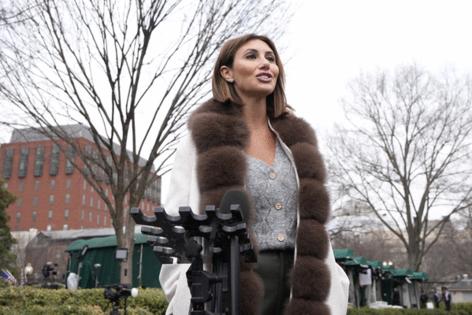Trump's DOJ sidesteps norms to boost ally Alina Habba as US attorney
Published in News & Features
President Donald Trump’s administration sidestepped tradition this week and criticized judges who sought to bypass his ally as the top federal prosecutor in New Jersey — a pattern that may repeat itself in other Democratic-leaning states.
The actions of the Justice Department to shield interim U.S. Attorney Alina Habba, Trump’s former personal attorney, could foreshadow other fights over chief federal prosecutors holding temporary posts in blue states like California, New York and Nevada.
Federal judges in New Jersey said Tuesday they would not extend Habba’s four-month tenure, the longest she could serve without U.S. Senate confirmation. When the judges bypassed Habba to pick her deputy, Attorney General Pam Bondi then slammed “politically minded judges” for overstepping their authority. She fired the judges’ choice, Desiree Grace, hours later.
Habba’s term is set to expire at the end of the week, and what happens next is anyone’s guess. But Trump and his appointees have routinely assailed judges who resist him in court cases, and they’ve shown a recent willingness to push the boundaries of statutes on appointment to protect their choices.
‘Little unclear’
“It’s a little unclear as to how this will all shake out,” said Jennifer Selin, an associate law professor at Arizona State University who researches U.S. attorney appointments. The law on appointing interim U.S. attorneys wouldn’t prevent Trump from naming Habba as the interim again, but it’s “definitely on the fringes of law,” Selin said.
Grace, a veteran prosecutor who’s worked in the New Jersey office since 2016, said late Wednesday that she’s still prepared to fill the U.S. attorney role once Habba’s term expires.
“Yesterday the District Judges for the District of New Jersey selected me to serve as the United States Attorney for the District of New Jersey,” she said in a LinkedIn post. “It will forever be the greatest honor that they selected me on merit, and I’m prepared to follow that Order and begin to serve in accordance with the law.”
Spokespersons for the Justice Department and the U.S. Attorney’s Office in New Jersey declined to comment.
U.S. attorneys typically serve four-year terms after they are approved by the U.S. Senate, and they leave en masse with the change of a presidential administration. Under Senate custom, if a home-state senator opposes a president’s US attorney nominee, the full body won’t confirm their appointment.
More than 20 states have two Democratic senators, but disputes may arise soon in Nevada, Illinois and California, where interim appointments are set to expire soon.
Trump has nominated Habba for a four-year term, but she’s drawn strong opposition from New Jersey’s two Democratic senators, Cory Booker and Andy Kim. Senate Minority Leader Chuck Schumer, a New York Democrat, has also vowed to hold up all Justice Department nominees over Trump receiving a gifted jet from the Qatari government.
‘Left-wing agenda’
District judges can appoint a U.S. attorney until a vacancy is filled, but that is prompting pushback from the Trump administration. Deputy Attorney General Todd Blanche accused New Jersey’s judges of “a left-wing agenda, not the rule of law” and acting like partisans and activists.
Such a posture is not a long-term recipe for success, said Daniel Richman, a law professor at Columbia University. Every U.S. attorney’s office investigates and prosecutes criminal cases and represents the U.S. in civil litigation. Its lawyers appear regularly in court before federal judges.
“An office that relies on the cooperation of judges to do its work usually doesn’t get ahead by making war on them,” Richman said.
In the Northern District of New York, the Trump administration tested the bounds of its appointment authority this month after federal judges declined to extend the 120-day term of John Sarcone, the chief prosecutor. Bondi appointed Sarcone as “Special Attorney to the Attorney General” and “First Assistant U.S. Attorney,” making him the acting leader under the federal law governing vacancies.
Sarcone is authorized to conduct the same legal proceedings as U.S. attorneys may conduct, according to records that say his appointment is “indefinite but may be terminated at any time.”
He could serve more than 600 days as an acting official under the vacancy statute, effectively bypassing the Senate, said Selin. Acting officials may serve under the vacancy law for up to 210 days, followed by up to two more 210-day stints if nominations for the seat fail in the Senate.
Trump’s administration also named two successive interim leaders to serve as U.S. attorney in Washington, DC, tapping Jeanine Pirro for a 120-day term after her predecessor, Ed Martin, lacked the Senate votes to advance.
“The Trump administration has been very strategic in using acting positions to navigate difficulties in the Senate,” Selin said.
_____
©2025 Bloomberg L.P. Visit bloomberg.com. Distributed by Tribune Content Agency, LLC.







Comments